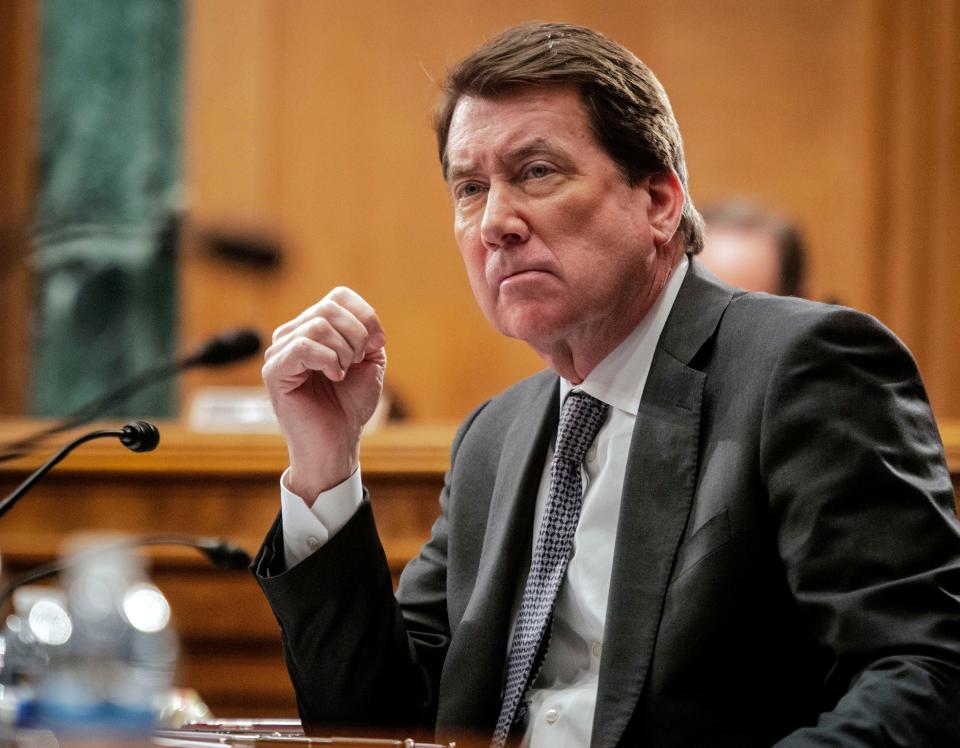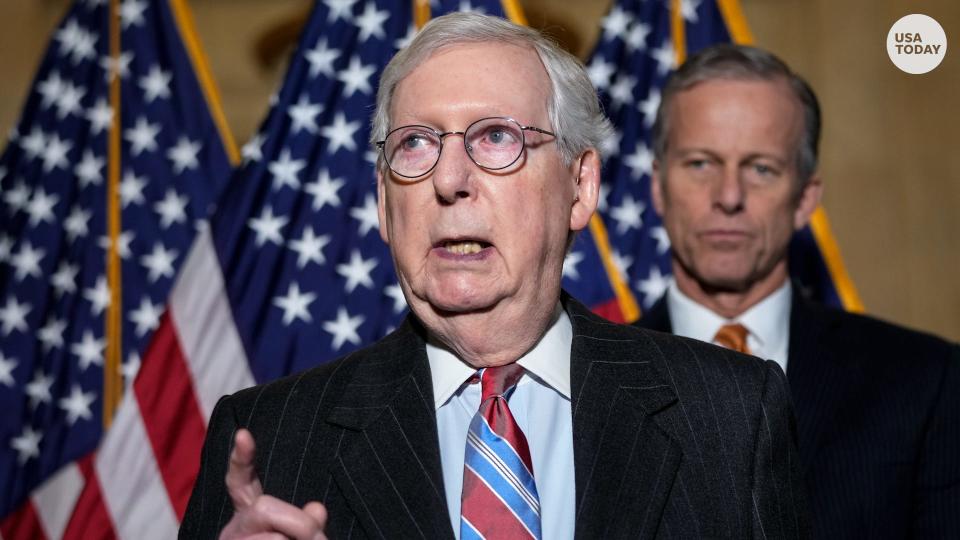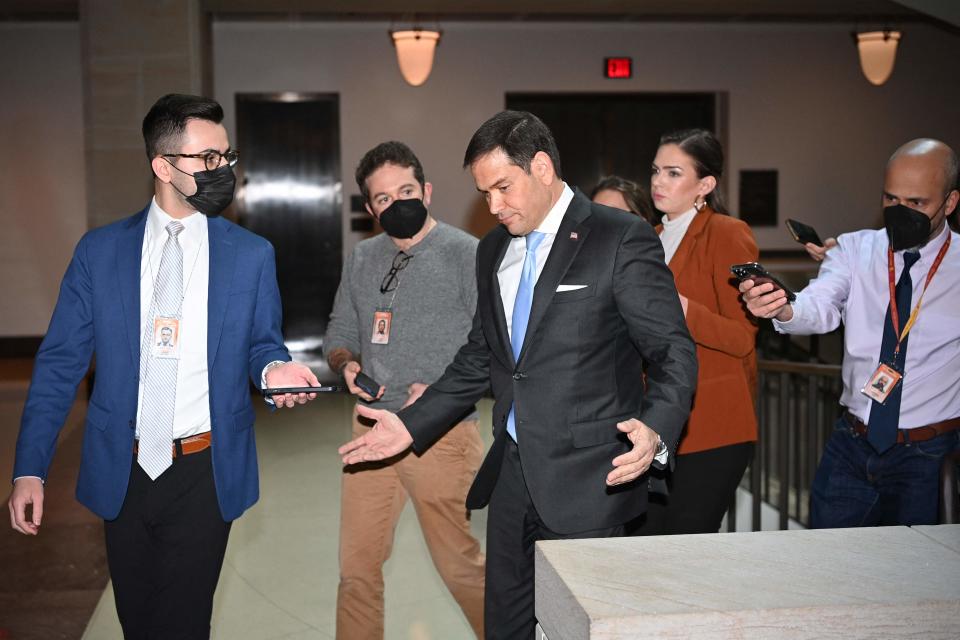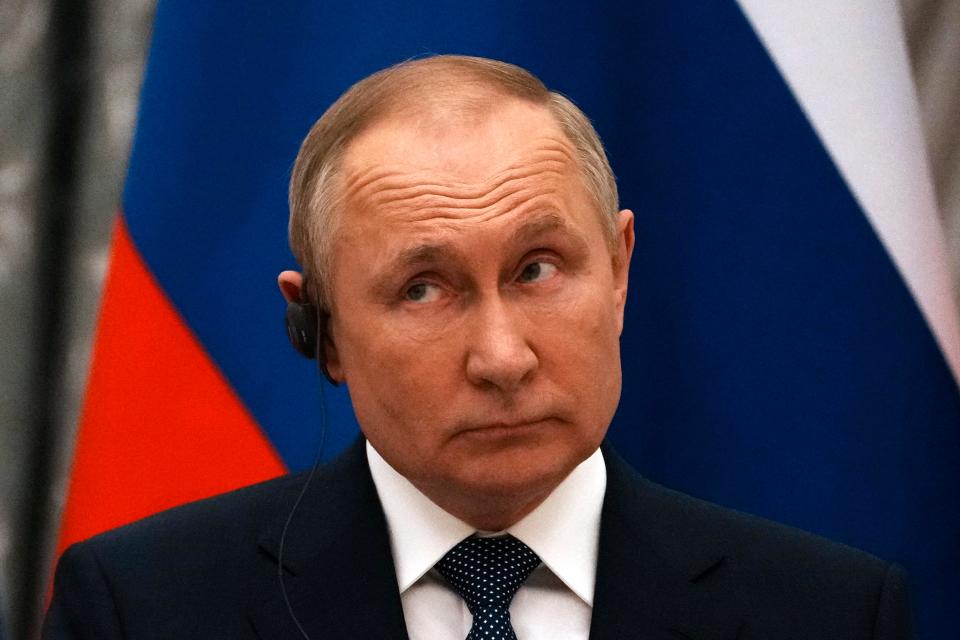Congress has tough words on Putin and Russia's aggression in Ukraine but can't agree on sanctions
- Oops!Something went wrong.Please try again later.
WASHINGTON – Despite universal condemnation on Capitol Hill over Russia's threat to march into Ukraine, lawmakers remain at an impasse on how hard and quickly to punish Moscow if it invades the Western ally.
Lawmakers on both sides back tough sanctions. But like most everything on Capitol Hill, the divide is largely partisan: Democrats are backing the Biden administration's wait-and-see approach about the steps it will take if an invasion occurs, while Republicans are demanding Biden take action now to deter an attack.
"I certainly would like to see the sanctions imposed yesterday," said Republican Sen. Bill Hagerty of Tennessee. "I'd like to see us demonstrate our resolve rather than just use sharp words. I'd like to give Vladimir Putin a taste of what's to come. And I think one strong way to do that is to begin to unpack sanctions right now."
But Sen. Elizabeth Warren said it was more important to present a united front behind President Joe Biden.
What would sanctions look like? Biden threatens devastating sanctions if Russia invades Ukraine. Here's what that might look like.
"The world has changed even over the last couple of weeks, so the timeliness of Russian sanctions may have moved in a different direction," she said. "But right now, it's important that we back up the president as he makes clear to Vladimir Putin that we will use all of our economic tools to make it very painful for Russia if they invade Ukraine."
More: NATO says Russian troop buildup near Ukraine continues despite Moscow's claims

Even a broadly worded bipartisan statement from Senate leaders late Tuesday that they are "prepared to fully support the immediate imposition of strong, robust, and effective sanctions on Russia" seemed only to underscore the notion that both parties have yet to come together on a specific measure.
On Tuesday, Russia appeared to blink. Reports indicated some troops may be pulling back from the Ukraine border, and Putin indicated he'd be open to more negotiations.
Hang-ups over timing, Nord Stream 2
Senate Democrats, led by Foreign Affairs Committee Chair Robert Menendez of New Jersey, have sponsored legislation designed to impose stiff penalties on Russia’s political and military leadership, its financial institutions and its energy industries, including the Nord Stream 2 gas pipeline. The hope is that the prospect of sanctions would deter Russian President Vladimir Putin from invading.
All U.S. property transactions and interests in property held by Putin and more than a dozen other top officials in Russia’s government and military would be blocked under the bill, which has White House support.
More: Biden threatens devastating sanctions if Russia invades Ukraine. Here's what that might look like.
More: 'Wakeup call for Americans': Russia, Ukraine in behind-the-scenes lobbying war over Nord Stream 2
The bill, known as The Defending Ukraine Sovereignty Act of 2022, also targets major Russian financial institutions, directs the Biden administration to develop a strategy to bolster Ukraine’s defense capabilities, and authorizes $500 million in supplemental emergency security assistance to Ukraine if Russia attacks.
Particularly irksome to Putin himself, the bill would require the U.S. State Department to issue a detailed report on Putin's personal net worth and his assets, along with those of his inner circle. Putin's chief nemesis inside Russia, jailed opposition leader Alexei Navalny, has risen to global prominence in part by working to expose corruption at the highest levels of Putin's government.

But the bill has failed to draw GOP support for two primary reasons: the timing of the actual sanctions and how to handle the Nord Stream 2 pipeline that would send gas from Russia to Europe.
The pipeline, potentially a major source of revenue for Russia, is fully constructed but not yet operational. Republicans are pushing to enact more sweeping penalties on the pipeline, including Texas Sen. Ted Cruz, who wants to impose sanctions on businesses associated with the pipeline from Russia to Germany. But in May, Biden waived sanctions on the company building the pipeline, arguing that it was almost finished and that imposing sanctions would be counterproductive to U.S.-European relations.
Before signing on to the bipartisan statement, Senate GOP leader Mitch McConnell chided Biden for not imposing sanctions now.
"I hope the administration is not going to wait until after an incursion to turn the screws and put some real sanction on the Russians. At that point arguably it's a little too late. ... Everything that could possibly be done to deter the Russians before an invasion is critically important."
Biden can act without Congress
Biden would like to have the blessing to sanction Russia from Congress, but he really doesn't need it, according to the nonpartisan Congressional Research Service in a paper last month.
"The President, for a variety of reasons related to constitutional construction and legal challenges throughout U.S. history, holds considerable authority when economic sanctions are used in U.S. foreign policy," CRS wrote in a recent paper. "If Congress enacts sanctions in legislation, the President is to adhere to the provisions of the legislation but is responsible for determining the individuals and entities to be subject to sanctions. The President also often has the authority to be the sole decisionmaker in initiating and imposing sanctions."
More: Russia-Ukraine explained: Inside the crisis as US, allies await next move
President Barack Obama did just that in 2014 when he declared that Russia’s annexation of Crimea in 2014 constituted a threat to the United States. Doing so meant he could impose sanctions on Russia, some of which remain in effect today.
Sen. Marco Rubio, the Florida Republican who sits on the Foreign Relations and Intelligence committees, agreed.
"The fact is, the president and the White House have all the legal authorities they need to impose the sanctions that need to be imposed, and so at this point, even if we had a deal, it's not going to pass for quite a while," he said. "By the time it passes, this thing will have gone one way or the other."

There are other complications to quick passage of a bill.
The House isn't scheduled to hold floor votes until March. And some senators already have signaled they would try to amend a sanctions bill, which would lead to further delays.
Alaska GOP Sen. Lisa Murkowski said she would want to add language countering Russia's ban on U.S. seafood imports that Moscow imposed more than seven years ago in response to Obama's sanctions for Crimea.

"So that's been in place all these many years. And it is absolutely unfair that Russia has unlimited access to sell its seafood in the United States," she said on the Senate floor. "America's fishermen and our seafood processors, particularly those in my state of Alaska, have no access to markets in Russia. So this embargo either needs to end or we need to incorporate reciprocal measures."
Do sanctions work?
There is no shortage of tough talk from either side.
"President Biden has made it extremely clear that if Russia rejects this diplomatic path and conducts further aggression against Ukraine, that there will be a heavy price to pay," Virginia Sen. Mark Warner said on the Senate floor Tuesday. "Russia will face the immediate imposition of strong, robust and effective sanctions – including sectoral sanctions against its banking and financial system … as well as stringent export controls that will damage its economy."
And though Indiana GOP Sen. Mike Braun would like to see more a forceful response from Biden, he says the threat of sanctions combined with a unified response from the U.S and its NATO allies are having an effect.

"I think we're coming from behind now, and we've pretty well laid all the options in Putin's lap, (but) I think that he's strongly reconsidering because it looks like, thankfully, all of NATO is kind of arm in arm on this issue," he told USA TODAY. "But when you let it get to the precipice like it has now, you never know what might happen in terms of an irrational decision, or something changing the dynamic."
But sanctions may not be the effective tool its supporters project, especially in Russia.
In 2018, U.S.-imposed sanctions on Rusal, a global aluminum firm, had broad effects that rattled Russian and global financial markets. It marked the first time Washington had designated a top Russian firm for sanctions that would affect nearly all economic activity. The sanctions were lifted after Kremlin-connected billionaire Oleg Deripaska, who is subject to sanctions, agreed to relinquish control of the company and two other firms, according to the Congressional Research Service.
On the other hand, Russia "has deepened its hold over Ukraine’s occupied Crimea region and separatist regions in eastern Ukraine. Russia has extended military operations to nearby waters, interfering with maritime traffic to and from ports in eastern Ukraine, and since 2021 has engaged in a buildup of military forces near the Ukrainian border," the CRS report said.
Rubio said he doesn't expect congressional inaction is keeping the Kremlin up at night.
"I don't think anyone should be under an illusion that Vladimir Putin is sitting around waiting to see what the Congress does and make his decision."
This article originally appeared on USA TODAY: Sanction Russia? Congress has no deal to punish Putin over Ukraine

